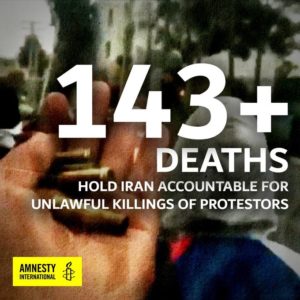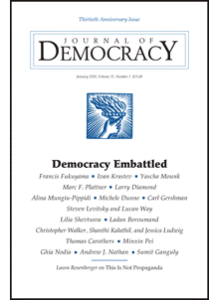Families of some protesters detained during the November unrest in Iran have been denied any information about them and fear they are dead, others who have been released say they were tortured to make self-incriminating confessions, Radio Farda reports.
According to Radio Farda’s estimates, at least 8,600 protesters were detained in 22 Iranian provinces. Human rights activists have so far compiled a list with of more than 500 protesters whose deaths have been confirmed. The list is available on Farsi Wikipedia and is regularly updated.
The Iranian labor movement is often overlooked in assessments of the country, but labor protest has been vociferous, broadly based and hard to suppress for two decades. Indeed, angry workers may be the political force most feared by the clerical regime, The Washington Post’s David Ignatius writes:
The regime’s anxiety about labor unrest was captured by the BBC Persian Television in a December story that quoted former president Mohammad Khatami. “If the middle-class and upper-class join with the working-class protesters, then no amount of military and security power can do anything. It will be the regime versus the people,” said Khatami, according to a translation by Alireza Nader, an Iran analyst at the Foundation for Defense of Democracies (FDD).
 The regime regards peaceful labor activism as a national security crime, VOA adds (above).
The regime regards peaceful labor activism as a national security crime, VOA adds (above).
“The regime fears organized labor, knowing full well that oil strikes were essential to bringing down the Shah in 1978 and 1979,” said Behnam Ben Taleblu, an analyst with the FDD, Ignatius adds. Mariam Memarsadeghi, who follows Iranian labor unions and co-founded a civil-society group called Tavaana, explained during an interview that there is a “synergy between labor strikes and street protests.”
“The past year has seen the stepping up of pressure by Iranian authorities against trade unionists and other workers protesting for their labour rights,” the United Nations said in a recent report on human rights in the Islamic Republic of Iran.
 Members of trade unions who advocate for labour rights have been under imminent threat of prosecution and imprisonment. For example, in August 2018, member of the board of directors of the Teachers’ Trade Union, Mohammad Habibi was sentenced to seven and a half years imprisonment for “collusion against national security”, 18 months imprisonment for “propaganda against the regime” and 18 months imprisonment for “disrupting public order”, Front Line Defenders adds.
Members of trade unions who advocate for labour rights have been under imminent threat of prosecution and imprisonment. For example, in August 2018, member of the board of directors of the Teachers’ Trade Union, Mohammad Habibi was sentenced to seven and a half years imprisonment for “collusion against national security”, 18 months imprisonment for “propaganda against the regime” and 18 months imprisonment for “disrupting public order”, Front Line Defenders adds.
In the latest issue of the @NEDemocracy’s @JoDemocracy, @LadiKhanom highlights the character of Iran’s theocratic ideology and stresses social and cultural changes over the past 40 years. #NEDemocracy #IslamicRevolution







